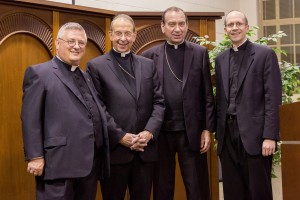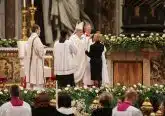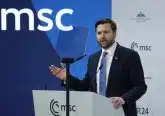Archbishop Lori: How to Save Our Religious Freedom
By Gail Deibler Finke

A robust church won’t have its religious freedoms challenged, Archbishop William Lori said in a brief interview following a lecture at The Athenaeum of Ohio November 1.
The Archbishop of Baltimore, who is also the head of the USCCB’s Committee on Religious Freedom and the Supreme Chaplain for the Knights of Columbus, Archbishp Lori deliveerd the annual LeBlond Lecture for Cincinnati’s Catholic seminary and graduate school.
Defined in the Vatican II document Dignitatis Humanae, he said, “religious freedom” means both freedom from government coercion and freedom to search for and follow truth. Like all human rights, Archbishop Loris said, the right to religious freedom comes from God. If not, “it’s easy to see how governments can claim to be not just the guarantor of our rights, but the granter of them.”
The definition was the work of both American theologians and bishops (including our then-Archbishop, Karl Alter) and of Europeans, including future pope and saint Bishop Karol Wojlyla. The American contribution – “and we should be proud of that “– is the idea of freedom from coercion. This establishes a government neutrality toward religion, “in which the government declares itself incompetent to deal with specific religious matters unless it has a compelling interest, and recognizes that religion has a constructive role in public life,” he explained.
Americans believed this, he said, because at the time “the American experience of limited government and religious freedom was working pretty well.” European and Easter European bishops and theologians, who had a different experience of government, insisted that the definition also include the idea that human nature is created by God and impels people to search for ultimate truth and follow that truth when they find it. People who cannot respond to the truth in their day to day lives as well as in their hearts, the document says, are not truly free.
Today, Archbishop Lori said, many people have lost sight of the importance of religious freedom, even many Catholics. Christians are being martyred around the world, and at home individual and corporate religious freedoms are being challenged by laws affecting everything from marriage and family life to the rights of religious groups to speak and assemble, religious organizations to hire for mission, and religious charities to operate according to their principles.
What can Catholics do? Archbishop Lori laid out six principles:
1) Pray. “Pray every day for persecuted Christians abroad, for restrictions on religious freedom here, for church officials, for lay people, for politicians, for wise and good leaders.”
2) Follow Pope Francis’s directive to deepen our relationship to Christ and undergo a “missionary conversion” that strengthens our commitment to live our faith, both as individuals and as a church.
3) Engage the culture around us, including our own Catholic culture. “Pope Francis said we must build a just and inclusive society, and that means we must do a better job of informing our fellow Catholics of religious freedom issues.”
4) Work to educate everyone, including non-Catholics, about the important of religious freedom, that it is being challenged, and what the consequences of losing it will be for society.
5) Use your personal networks to spread this knowledge
6) Speak with public officials about preserving our freedoms.
Catholics teaching other Catholics the importance of religious freedom, he said, is key. “Unless we engage our own Catholics, our ability to engage the public will be compromised,” he said. Bishops can and do write letters, join committees and task forces, meet with lawmakers and business leaders, and work to hand on the Church’s teachings.
But the laity must do the same, he said. ‘“Our legislators need to hear from Catholics. When we have a robust church, secular culture can’t impose itself. “
Read Dignitatis Humane here:
http://www.vatican.va/archive/hist_councils/ii_vatican_council/documents/vat-ii_decl_19651207_dignitatis-humanae_en.html













